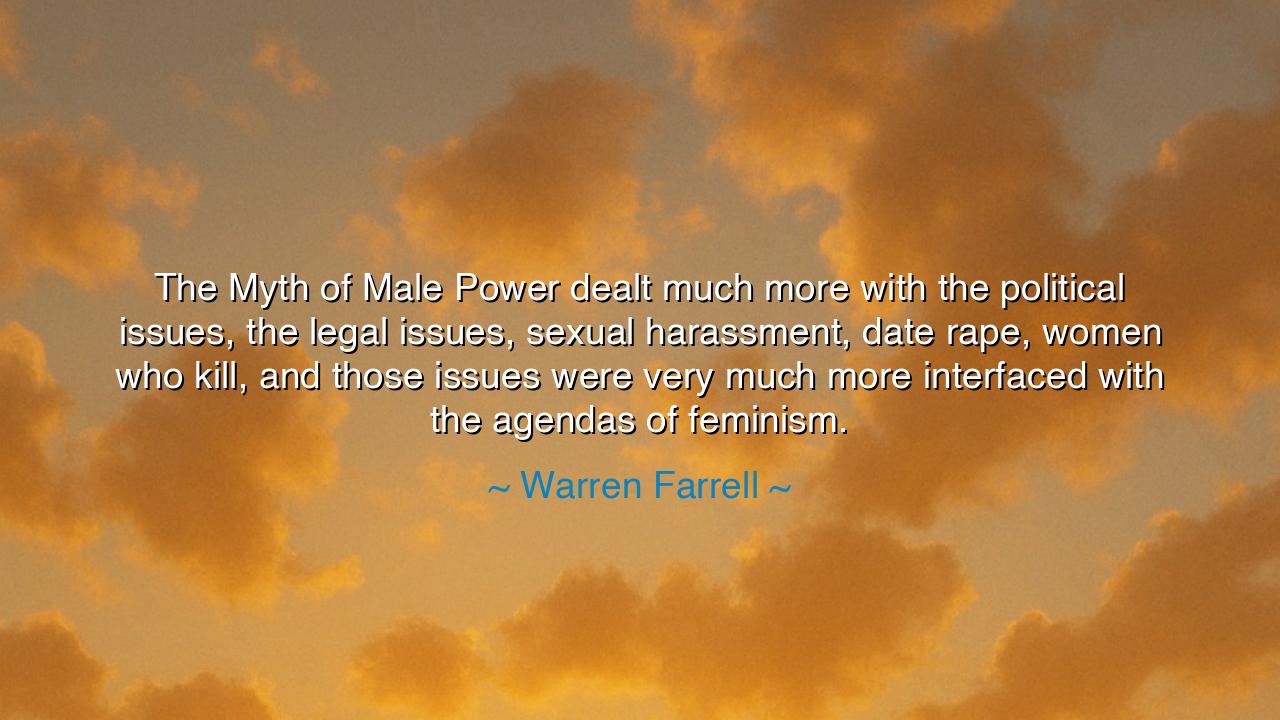
The Myth of Male Power dealt much more with the political issues
The Myth of Male Power dealt much more with the political issues, the legal issues, sexual harassment, date rape, women who kill, and those issues were very much more interfaced with the agendas of feminism.






The words of Warren Farrell, spoken with the weight of controversy and conviction, unveil a deep struggle in the battle of ideas: “The Myth of Male Power dealt much more with the political issues, the legal issues, sexual harassment, date rape, women who kill, and those issues were very much more interfaced with the agendas of feminism.” Here, Farrell reflects upon his work and its place within the larger dialogue of gender, power, and justice. He acknowledges that his book was not born in a vacuum, but within the storm of political and legal issues, issues already bound tightly to the agendas of feminism, which had risen to great prominence in the latter half of the twentieth century.
At the heart of his saying lies the recognition that the struggles of gender are political. To speak of sexual harassment, of date rape, of violence, or of women who kill, is not merely to recount individual tragedies, but to confront the structures of law and society that interpret, prosecute, and respond to such acts. Farrell’s words remind us that every such issue is framed not only by personal experience but also by the great machinery of law and ideology. To write of male power or female victimhood is therefore to enter into the battlefield of politics itself.
The origin of his words lies in his book The Myth of Male Power, published in 1993, in which Farrell sought to challenge dominant feminist narratives of men as privileged oppressors. He argued instead that men bore burdens and vulnerabilities that were often ignored: dangerous jobs, military service, expectations of provision, and legal disadvantages in family courts. In naming feminism’s agendas, Farrell admits that his work collided directly with the prevailing winds of the time, and thus became entangled in debates over justice, equity, and truth.
History gives us echoes of this struggle. In the age of the suffragettes, women demanded the vote, facing prison, ridicule, and scorn. Their movement sought to reframe politics itself, declaring that women’s voices must shape the laws of the land. Later, the feminist waves of the twentieth century turned their focus to workplace harassment, reproductive rights, and sexual violence. Farrell, by contrast, sought to broaden the frame, to argue that men, too, bore wounds within the structures of gender. His words, then, reveal a clash not only of issues, but of perspectives on power itself—who holds it, who suffers from it, and how it should be understood.
The power of his quote lies also in its provocation. To speak of women who kill, or of sexual harassment, through the lens of a book challenging feminist orthodoxy, was to ignite fire. Yet it is in fire that metals are tested. His reminder that these issues are interfaced with agendas is both warning and truth: for all great social movements, whether feminist or otherwise, are not only about justice but also about shaping narratives, seizing moral ground, and framing the way problems are understood. To recognize this is not to dismiss the movements, but to see them clearly, as human endeavors both noble and flawed.
The lesson of Farrell’s words is that we must approach debates about gender, politics, and law with both courage and humility. Issues like harassment and violence cannot be dismissed, but neither can the experiences of men be ignored. When one side monopolizes the conversation, truth becomes partial, and justice becomes unbalanced. The task of wisdom is to listen fully, to weigh carefully, and to act justly, even when the currents of ideology pull hard in one direction.
Therefore, children of tomorrow, take this teaching into your hearts: beware of those who tell you that power rests only in one gender, or that justice belongs only to one voice. Remember that political issues and legal issues are mirrors reflecting the struggles of all humanity. Seek always the deeper truth, even when it is uncomfortable, and strive to balance compassion with fairness. For only in the harmony of voices—male and female, strong and vulnerable, accused and accuser—can we approach the true circle of justice, and build a society where power is not myth, but responsibility shared.






AAdministratorAdministrator
Welcome, honored guests. Please leave a comment, we will respond soon